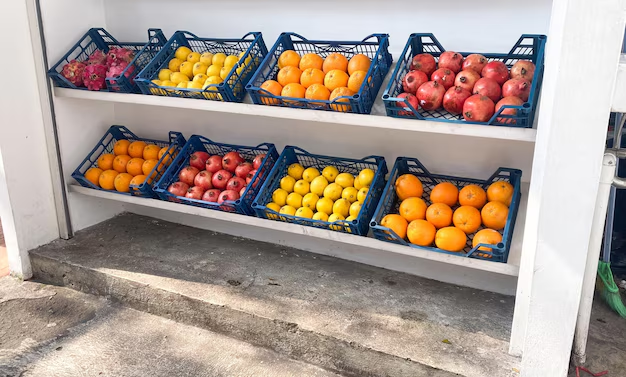Keeping Grapes Fresh: A Comprehensive Guide to Refrigerator Storage 🍇
Discovering a moldy or shriveled grape can be a small heartbreak for fruit lovers. The joy of picking up a bunch of luscious, plump grapes from the store can quickly turn sour if they're not stored correctly. Grapes are a delightful snack that can either refresh your palate or disappoint you with their lackluster texture if stored improperly. So, how do you ensure those juicy globes stay fresh after you bring them home? Let’s explore the best ways to store grapes in your refrigerator effectively, so they maintain their flavor and freshness for longer.
Understanding Grape Storage Basics
The Importance of Proper Storage
Proper storage of grapes can significantly extend their shelf life and preserve their taste. Grapes, like many fruits, can quickly become a breeding ground for mold or start to dry out if not handled correctly. Since they're typically harvested and transported long distances, they often arrive in stores with optimal freshness already waning. Storing them correctly ensures you can enjoy them at their best for as long as possible.
Key Factors Affecting Grape Shelf Life
Several factors play a role in determining how long your grapes will stay fresh:
- Temperature: Grapes prefer a cool environment.
- Humidity: Enough moisture is crucial to avoid drying out, but excess humidity can cause mold.
- Air Circulation: Allows moisture to evaporate, reducing mold risk.
- Handling: Minimal bruising and squeezing help prevent deterioration.
Step-by-Step Guide to Storing Grapes
1. Selection and Pre-Storage Preparation
Choosing Fresh Grapes: Before even thinking about storage, the process begins at the store. Look for firm, plump grapes with consistent coloring without any wrinkles or mushy spots.
Avoid Pre-Washing: As tempting as it is to wash fruits when you get back from shopping, resist the urge. Washing grapes before storage adds moisture, which can encourage mold growth. Rinse them just before eating.
Releasing from Packaging: Most grapes come in plastic bags with tiny holes for air circulation. While this packaging is generally suitable, consider gently moving them to a dry container lined with paper towels to absorb any excess moisture.
2. Optimal Refrigeration Techniques
Ideal Refrigerator Placement: Store grapes in the refrigerator's crisper drawer, which provides a cool and slightly humid environment. If your refrigerator has a humidity slider for the crisper, set it to a higher level to help maintain the grapes' plumpness.
Use an Airtight Container: If you choose to transfer grapes from store packaging, place them in an airtight container lined with paper towels. The paper towels absorb moisture, while the container prevents excess exposure to dry air.
3. Maintaining Freshness
Check Regularly: Periodically inspect your grapes for any signs of spoilage, such as soft spots, discoloration, or mold. Removing spoiled grapes can prevent the spread of decay to the rest.
Avoid Overcrowding: Give the grapes enough space to breathe. Excess crowding can trap moisture and facilitate mold growth.
Understanding Shelf Life: Generally, refrigerated grapes can remain fresh for up to two weeks. However, this can vary based on freshness at purchase and storage conditions.
Enhance Your Grape Experience with These Tips
Washing the Right Way
When you're ready to enjoy your grapes, wash them thoroughly under running water. Focus on removing debris and potential pesticide residues. A produce brush can be used gently for added cleaning, especially if you spot any residual dirt.
Freezing Grapes for Long-Term Storage
If you find yourself with more grapes than you can consume before spoilage, consider freezing them. Here's a quick guide:
- Wash and Dry: Rinse grapes and dry thoroughly to prevent freezer burn.
- Spread and Freeze: Lay them out on a baking sheet in a single layer and freeze.
- Transfer to Permanent Storage: Once solidly frozen, transfer them to a freezer-safe bag or container.
Frozen grapes make a refreshing snack and can be used directly in smoothies or as cooling elements in drinks.
Culinary Ideas Beyond Snacking
Grapes are delicious as a standalone snack, but their versatility doesn't end there. Consider these creative culinary applications:
- Salads: Toss grapes with your favorite greens for a refreshing burst of sweetness.
- Cheese Pairings: Serve them alongside a cheese platter for a sophisticated touch.
- Desserts: Use them in fruit tarts or bake them into cakes for added moisture and complexity.
Avoiding Common Storage Mistakes
Proper handling and storage can prevent grapes from becoming an afterthought in the produce drawer. Here's what to avoid:
- Washing Before Storage: As mentioned, this adds undue moisture.
- Sealed Plastic Bags: Without proper aeration, moisture and gases cannot escape, leading to spoilage.
- Ignoring Less-than-Fresh Grapes: Remove any questionable grapes to protect the rest from accelerated decay.
Visual Guide: Quick Tips for Storing Grapes
🔹 Before Refrigeration:
- Select firm, plump grapes.
- Avoid washing before storage.
- Remove any bad grapes immediately.
🔹 In the Fridge:
- Store in crisper drawer for ideal temperature.
- Use a paper towel-lined container for humidity control.
- Inspect regularly for spoilage.
🔹 Enhance Freshness:
- Handle gently to avoid bruises.
- Provide space for air circulation.
- Consume within two weeks for optimum taste.
Conclusion: Preserve, Enjoy, and Maximize
Preserving the freshness of grapes ensures you not only protect your investment but also continuously enjoy the vibrant taste they bring to your meals or snack times. Whether using grapes for on-the-go snacks, artistic culinary ventures, or simply enjoying them as a dessert, proper storage in the refrigerator is crucial. With the right techniques and knowledge, you can extend their shelf life, preserve their nutrition, and make each grape a delightful treat from the first to the last.
By adopting these methods, not only do you maximize the crispness and juiciness of your grapes, but you also reduce food waste, contributing to more sustainable consumption habits. So, next time you bring home that bunch of grapes, you'll know exactly how to keep them fresh and delicious until the last one is enjoyed!

